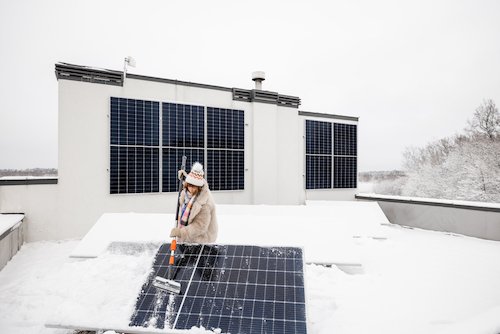Do Solar Panels Work in the Winter?
How do Solar Panels Work in the Winter?
There is a growing interest in solar power across the country as people look for ways to not only protect the environment, but also start saving some money. With solar power technology becoming more efficient and prices dropping, the thought of powering our homes and businesses appeals to many, but some will still hesitate, wondering do solar panels work in the winter?
It is a fair question. The very name “solar panel” tells you that the production of energy is dependent on sunlight. For those who live in areas where there is comparatively little sun and those who endure long, cold, and dark Canadian winters, the concern is logical.
If you are considering the use of solar and want to know do solar panels work in the winter, keep reading.
Do Solar Panels Work in the Cold?
When thinking about the sun, many people automatically associate it with heat, and they have an image of solar panels being used on hot, sunny days. Bright summer days are great for producing solar energy, but while it may seem counter-intuitive, solar panels don’t rely on heat. In fact, high temperatures can negatively impact solar panel efficiency.
Photovoltaic modules are tested at a temperature of 25 degrees C. As the temperature of the solar panel increases, so does the output current, increasing exponentially. The voltage, however, is reduced linearly and output efficiency can be reduced by 10-25%, depending on where they are installed.
As for cold weather, panels can still turn sunlight into electricity even when the temperature dips below the freezing point, because the panels absorb energy from the sunlight and not the heat. The colder temperatures actually provide the optimal condition for greater efficiency.
How Does Cold Weather Affect Solar Efficiency?
To understand why the cold makes your solar panels more efficient, we need to understand how they work.
Most solar panels today use silicon as a semiconductor material. When photon particles in sunlight hit the solar panel photovoltaic cells, it causes movement in the electrons of the silicon. This, in turn, creates the electric current that is sent to the electric distribution box, supplying power. In cooler temperatures, the electrons in the silicon are at rest (low energy). Once activated by sunlight (high energy), a greater difference in voltage is attained. Heat creates resistance in a circuit but once that heat is removed, more energy can be produced.
So, while hot summer days may seem like the ideal condition for solar power production, it is the colder months that work best. The shorter days of winter do have an impact, but the increased efficiency can help to compensate for fewer hours of direct light.
Do Solar Panels Work in the Snow?
The cold is not the only issue to deal with in winter.
There is also the not-so-small issue of the snow, which can be considerable in most parts of Canada. Can solar panels work in the snow?
This is another logical question from those with concerns about the suitability of solar power where they live. Solar panels don’t need heat, but they absolutely do rely on sunlight, so isn’t the snow going to pose a problem?
You have probably noticed that solar panels are installed at an angle. This serves to turn them more fully toward the light, but it also helps to keep them clear of snow and debris. The surface of each panel is smooth, allowing the snow to slide off easily, rather than accumulate. Additionally, the panels warm up slightly during operation. This also helps encourage the snow to slide off easily.
If a light dusting of snow gathers on the panel, it won’t be enough to significantly impact the performance. Even during snowstorms, when heavy cloud cover diminishes the amount of natural light, the panels will continue to work. Energy production only ceases if the panels are completely covered, with no ambient light reaching them.
It may also be surprising to learn that the snow can help increase energy production. If you have ever been out skiing on a sunny winter day, you have no doubt experienced the blinding reflection of sunlight on snow. The ability of surfaces to reflect sunlight is known as the Albedo effect. On cold, clear days, snow can reflect sunlight onto your solar panels like a mirror.
Do Solar Panels Require Maintenance in the Winter?
As mentioned, snow tends not to accumulate on solar panels due to their smooth surface, the angle at which they are installed, and the fact that they warm slightly. That isn’t to say that snow can’t pile up during a snowstorm or in certain situations.
During particularly heavy snowfalls, some snow and ice may gather on your panels, but if they are located on your roof, then it is not advisable to try to climb up there to clean them. In time, they will most likely come clean on their own, but if you have ground-mounted solar panels and want to be a bit more proactive about cleaning them, you may do so with a soft brush. Do not attempt to clean them with a broom, or anything that is rough or solid, as you may scratch the tempered glass.
If you are concerned about the weight of snow on the panels, you can put your mind at ease. Solar panels are built to withstand the weight of snow. You can check the specific panel to see how much, but the average panel can hold up to 800 lbs/ 362 kg. This means that, in general, you will have very little maintenance to perform on your solar panels, if any.
Although it is understandable that many would be concerned about how well solar panels work in winter, you can be assured that they do work quite well and, in some ways, even benefit from the cold and snow
Solar panels are a year-round energy solution, even in the winter! While snow and shorter days can affect production, modern solar systems are designed to perform efficiently in cold weather. In fact, solar panels can often generate more power in colder temperatures due to improved conductivity. If you’re considering solar energy for your home, visit Sunly.ca to explore your options. Learn more about solar panel costs, how many panels you might need, or contact us for expert advice. Don’t forget to check out our customer reviews to see why homeowners trust Sunly for their solar needs. Go solar today and enjoy clean energy all year long!
For more information about adopting solar power, please contact us today and we will be happy to answer all your questions.


